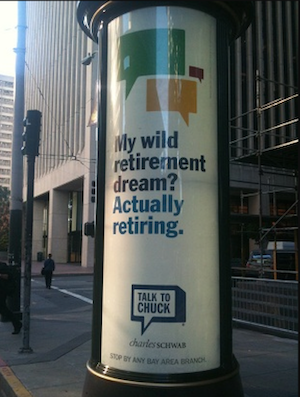Do the math. We all spend a significant percentage of our lives at work. And, based on this poster by Charles Schwab and the state of the Government’s finances, we are all going to be working even longer. So as leaders it is our role to make sure that the lives of our staff are valuable and rewarding, if not fun.

People have incredible levels of drive, ability, and enthusiasm (as evidently clear by the videos that pop up in my social media feeds), and we need to harness that.
Thought: Why is happy hour just an hour and happens after work?
There has been a lot of research recently that is showing that (wait for it…) happy employees are more productive. I guess we knew that instinctively, but now studies are putting some data behind the feeling.
As long ago as 2007, people like Alexander Kjerulf, who bills himself as Chief Happiness Officer, have been writing and talking about the effects of a happy workplace on productivity. He has written a book called Happy Hour is 9 to 5 which has been published by Lulu.
University of Warwick’s Economic Research Institute discovered that happier workers were 12% more productive, unhappier workers were 10% less productive.” The team, led by Andrew Oswald, a professor of economics at Warwick Business School and a leading authority on the relationship between economics and mental health, said its research has important implications for the worlds of politics and business.
“We find that human happiness has large and positive causal effects on productivity,” the team said. “Positive emotions appear to invigorate human beings, while negative emotions have the opposite effect.”
A Forbes.com article It Pays To Be Happy At Work by Vicki Salemi summed it up well: “Happiness at work doesn’t just boost morale, it leads to better reviews, faster promotion, fatter salaries and higher productivity”. Vicki has written a number of articles highlighting the link between happiness and performance.
One of the books I am reading—Humor, Seriously: Why Humor Is a Secret Weapon in Business and Life (And how anyone can harness it. Even you.)—talks about how you can have fun and be professional and effective.
Netflix’s unorthadox work culture has been so successful that they even wrote a book about it: No Rules Rules: Netflix and the Culture of Reinvention. So much of the book resonates with our philosophy of running Elements.cloud. People are more productive and happier when surrounded by other happy and productive people. They talk about giving people the context and then trusting them to get on with what they need to do. No policies.
But what does happier mean?
Feeling valuable, achieving, and being rewarded is the positive side—which should be reinforced. The negative side that we should be eliminating includes feeling embarrassed, confused, unworthy, wasted, and uninvolved.
A surprising number of these factors can be influenced by letting people know what they should be doing, how they should be doing it, and how well they are doing. Process and Metrics. Who would have thought processes were a route to happiness?

















